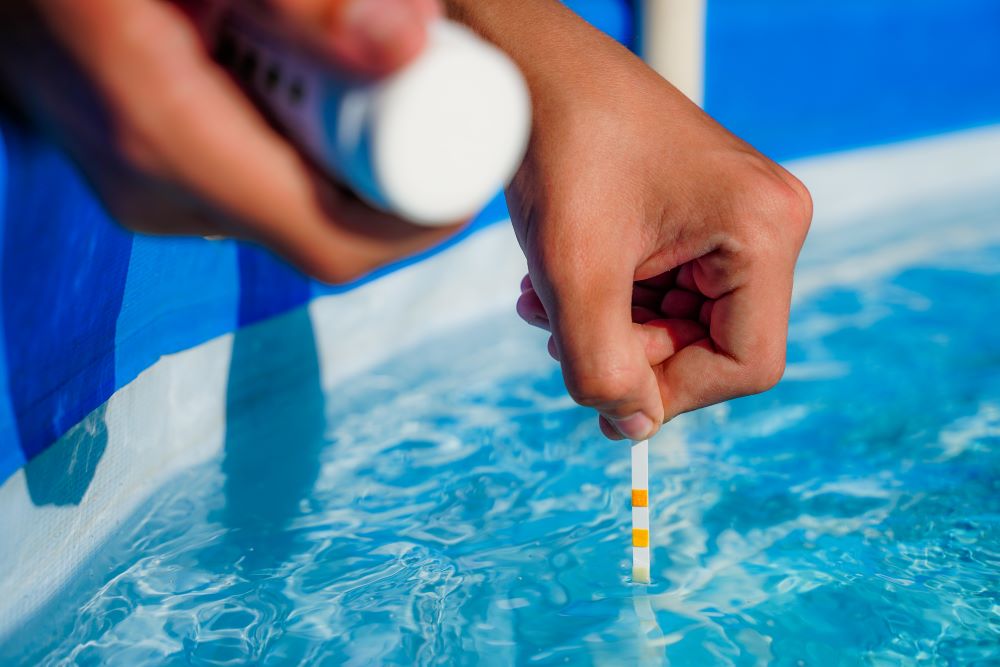Using pool chemicals is necessary if you want to swim safely. However, pool owners don’t become expert chemists just because they built a pool. That makes learning about these chemicals even more important since misusing or mishandling them can be hazardous.
Using too much or too little could be unhealthy. Additionally, many pool chemicals sold to consumers aren’t very effective or aren’t EPA-approved.
How is anyone supposed to decipher what’s right from wrong? Here’s a quick but thorough guide to pool chemicals and the EPA standards so you can confidently do your pool maintenance.
What Does It Mean When a Chemical Is EPA-Approved?
The EPA’s job is to maintain and protect the health of the public and the environment. So it’s natural that this government agency would also regulate the labeling of pool chemicals. These labels help consumers know what they’re getting and decipher which ones are safe to use in their pools.
Labeling will always contain information about the chemicals, including any active ingredients and how they could impact your health. If you see anything labeled with “warning” or “caution,” this means that misusing the chemical could be unsafe.
That doesn’t mean you can’t use these chemicals in your pool. Instead, you need to be particularly careful when you do.
Anything with an EPA-approved label has undergone much testing to meet the agency’s high standards. That’s why buying chemicals with EPA approval is crucial.
The label helps keep you safe while informing you precisely what the product contains. These labels also confirm that the chemicals will actually clean your water, which is also important; you don’t want to waste your money on something that won’t work.
How Do You Know What to Avoid on a Label?
One of the best ways to avoid confusion when purchasing and using pool chemicals is to always buy from trusted brands. However, unreliable brands go through a lot of trouble convincing you that they’re legit, so don’t hesitate to research or ask an expert if you’re unsure.
EPA-approved chemicals will also have registration and establishment numbers somewhere on the label. If the chemicals don’t have this, steer clear.
There’s no world in which the EPA approved that product.
You may realize you’ve been purchasing knockoff products that aren’t EPA-approved. In that case, it’s wise to stop using them immediately and contact a waste management company to learn how to dispose of the chemicals safely.
Maintaining Your Pool Chemicals
Now that you’re sure you have the right chemicals, it’s time to use them the right way. There are three key aspects to keeping your water balanced and healthy: alkalinity, pH, and calcium hardness.
A suitable pH for a pool should be somewhere between 7.4 and 7.6. The pH can change quickly, so ensure you have something on hand to counterbalance an increase or decrease.
If you’re having issues balancing alkalinity, note that rebalancing it can increase the pH, too. You could use this symbiosis to your benefit by using alkalinity increasers to balance out both levels simultaneously.
A good target for calcium hardness is around 175 ppm to 300 ppm. Calcium is there to help keep the walls and floors of your pool healthy. Avoid going over the 300 ppm mark; if you do, you could see calcium start to build up around your pool.
The most popular sanitizing solution is chlorine, but you can also use certain salts and minerals instead of or with chlorine to keep your pool clean. Chlorine is popular because it’s very effective and affordable. Keep in mind that chlorine alternatives or mineral systems may still need a small amount of chlorine to keep your pool sanitary.
How can you keep all of these chemicals perfectly balanced? You should have water testing equipment like test strips that give you details about your pool’s chemical levels.
You should test often since many factors, even excessive pool use, can drastically alter the chemistry. You should also invest in professional pool maintenance to ensure you do everything right. Pool experts can also help you find easier ways to get the results you need and recommend products that might be more efficient.
Call for Professional Pool Care and Maintenance
The right balance of chemicals — and only those that are EPA-approved — is essential for proper pool maintenance. Without them, your pool can be unhealthy or unsafe to use.
Fortunately, we’re here to simplify everything for you! Call Calm Waters today to get all of your pool cleaning and maintenance needs cared for.





